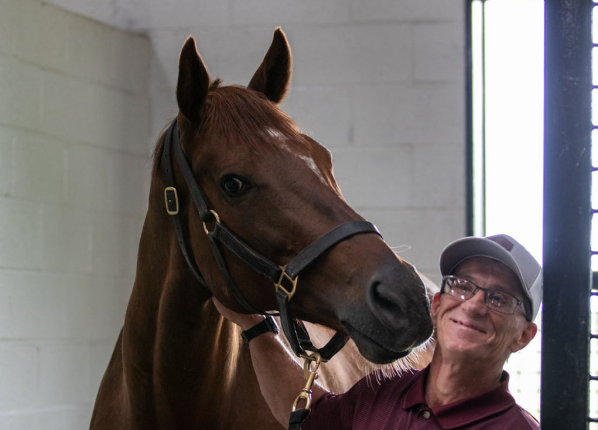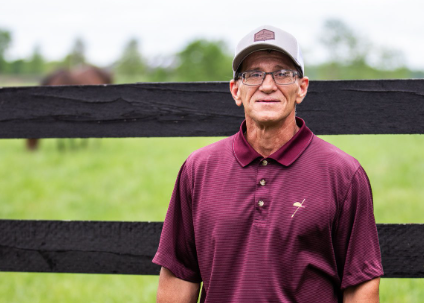It was during the moments after Billy Major came face-to-face with death, and momentarily lost the battle, that he knew something needed to change. On November 14, 2022, as he awoke on the floor of a motel room after overdosing on heroin, Major felt the hand of God rest upon his shoulder. And this time, he reached over to take it.

“I woke up laying on the floor in front of my refrigerator. I saw people sitting on the bed, some of my friends, and there was a gentleman with EMS. I said, ‘What’s going on?’ as I tried to breathe through an oxygen mask. And he told me, ‘Young man, evidently you overdosed from a high dose of drugs,” recalled Major.
It wasn’t the first time Major overdosed, though it was the latest detrimental experience in a series of unfortunate events that had led him to reside in the motel room in the first place. And it was quite the contrast from the way he lived in his early years, growing up in both Kentucky and Ohio, surrounded by family and fueled by a passion for sports.
As a young boy, his love of the game was only amplified by his parents’ own baseball card shop. Major pursued everything from football to wrestling, gymnastics, pole vaulting and even martial arts. When he wasn’t in school or playing sports, he was by his dad’s side helping him build barns.
However, once he was ineligible to continue wrestling, Major turned a side job in the summer into more of a full-time gig, which eventually led to him quitting school altogether.
“I missed 80-something days my freshman year and 100 some my sophomore year. At that point, I never continued with school. But some of those teachers really cared about me, and they knew I could learn almost anything, so I’d show up there to visit and see how school life was going,” said Major.
Life took a downward turn later on for Major when he found himself in trouble with the law, resulting in a prison sentence of three to 15 years in Ohio. After serving part of his time, he was released on parole, until a slip up with cannabis use landed him back behind bars.
“I didn’t hardly drink alcohol growing up, and I didn’t use drugs until I was older in life, like 16 or 17 I guess,” said Major. “But I messed up. They gave me a choice, I was doing good, but I still violated my parole. Plus, you go back and start on the time you were originally given.”
Once he was finally out, Major eventually made his way to Lexington, Ky., where he spent time in treatment programs at the Hope Center and later utilized services offered by New Vista, which eventually helped him find an apartment and supported him while he resided in it.
Though he’d faced the highest of highs and lowest of lows as he dealt with his drug use, nothing could have prepared Major for the suffering he’d endure after being hit by a car in January of 2022 while pushing his friend in a wheelchair across the street. The accident left his body broken, suffering from a fractured fibula, tibia, knee, and C5-C6 in his spine.
“I went to Cardinal Hill Rehabilitation where I had to relearn how to walk. I knew that I could walk, but my mind wouldn’t react with my body. I was in a cervical column for five and a half months, a leg brace for five months, and I was in a wheelchair. I was also prescribed all kinds of medication,” said Major.
However, the most harmful injury of all was extensive trauma to his brain, which was only exacerbated when he overdosed in the motel room that fateful night later in the year. The trauma of the car accident, combined with the lack of oxygen when he overdosed, has resulted in a permanent change that can make it hard for Major to stay on topic when conversing.
Yet when he shares his story, the details he does remember are so vivid, it’s like you’re walking through those chapters of his life alongside of him.
And that’s when he brings us back to the scene of the final overdose. The final time he would use a drug and suffer the nearly fatal effects of it.
“My case manager had a routine visit the next day. When he came, I told him, ‘I died last night.’ He said, ‘Mr. Major, tomorrow you’re going to go to a treatment program.’ He’d been my case manager for three years, so I knew he was looking out for the well-being of myself and others,” said Major.
On November 16, 2022, he entered the 28-day residential treatment program at New Vista’s Schwartz Center.
“I learned grounding, coping skills, and conflict resolution. I learned about emotions, everything that I think of. I realized that I was the problem, no matter what, with the drug usage. I was the problem, I made that choice, it’s nobody’s fault but mine. You don’t blame the drug dealer; you don’t blame the chemists. You blame yourself for making that decision to use,” said Major. “I started to learn about recovery as a person. By doing the exercises they pass out in treatment and being one-on-one with a counselor or therapist, I started to get memory back.”
Though he was offered a housing voucher for a new apartment after completing treatment in the Schwartz Center, an appreciation for structure and time spent as a fan of horse racing pushed Major in the direction of the Stable Recovery program. He started this new chapter on December 14, 2022.

Initially Major was overwhelmed with feelings of awkwardness and discomfort, but soon the layout of the program, the security of routine and the overarching sense of community and brotherhood washed all of that away. And the School of Horsemanship, providing the opportunity to work hands-on with horses at Taylor Made Farm, only added to that.
“It’s very therapeutic. It’s very healing. Once you start a relationship with that horse and that horse trusts you, there’s not hardly anything it won’t do [for you], it’s amazing. The [therapeutic nature] of the horses and working with them, I really sponged up what they were teaching me,” said Major. “When you’re in there grooming a horse, you start to notice maybe one horse does this and that another horse doesn’t do that.
“It’s very helpful for anybody. You don’t have to be a drug addict or an alcoholic.”
Outside of the responsibilities and expectations, Major’s time in Stable Recovery and working in the School of Horsemanship gave him time to process, heal and reflect.
“I have a goal every morning. I have to look myself in the mirror and say, ‘I can do all things through Christ who strengthens me.’ Looking at yourself in mirrors and seeing your reflection on a regular basis, it brings back something. It’s not only a reflection of what you look like,” said Major. “I’m just glad that it took a higher power, along with my case manager and treatment, for me to continue to change. Knowing that I put my friends in a bad position [that night at the motel], I felt bad. I had to deal with that and understand how I put myself and them in that position.”
In 2023, Major graduated from the Stable Recovery program in March, was hired full-time by Taylor Made in April and by December, he officially became a Stable Recovery Legacy, which a graduate of the program earns after a year of sobriety.
“I’m a horse enthusiast but I never thought about working with horses until this opportunity. I do my faith first, then my recovery, and I try to be the best professional I can,” he said. “You can take alcohol and drugs away, but you’re still going to deal with everyday problems. Stable Recovery and the School of Horsemanship combined, it really sets someone in recovery up to succeed in life, to become a better version of themselves.”
As someone who has started over, in more ways than one, Major has developed an affinity for the aftercare aspect of the Thoroughbred industry and is a particular admirer of the New Vocations Racehorse Adoption Program. Though he loves his job at Taylor Made, and appreciates the entire team that has become his family over the last couple of years, the 49-year-old sees himself venturing out in the industry one day.
“I run around here like I’m 25 or 26, but I’m 49 years old. I’m not going to keep doing all this stuff the rest of my life,” said Major. “If I ever left here, it would have to be something private, working as a groom. Or it’d have to be [aftercare], working on the bigger picture where [racehorses] go on to be something else.”
For Major, it’s faith and recovery first. But when you see him in a stall with a mare and foal, a soft smile upon his face as his hand strokes the foal’s neck and the mare nuzzles his head, you truly understand divine intervention.
“I feel like God’s calling me to do something,” he had said earlier.
Indeed, he has.
By Sara Gordon, TDN Writer
Learn more about Major’s story at The Road Back: A ‘Major’ Redemption (thoroughbreddailynews.com)
